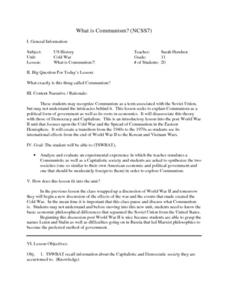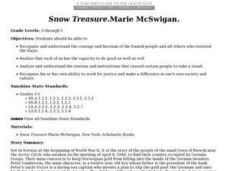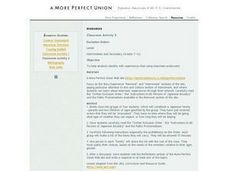PBS
President Theodore Roosevelt: Foreign Policy Statesman or Bully?
Can a negative perception of a president's foreign policy harm his or her historical legacy? A project that winds the clock back to the date of Theodore Roosevelt's death puts students at the editorial desk of a fictional newspaper....
Curated OER
Radioactive: An Interdisciplinary Study of Marie and Pierre Curie
Use this innovative text to show the far-reaching influence of the dynamic Curie couple
US Holocaust Museum
Deconstrucing the Familiar
Collaboration and complicity. Class members examine a series of photographs and consider how active participation and passive complicity represented in the photos contributed to the Holocaust.
Curated OER
Capitalization of Nouns
Which nouns are capitalized? Challenge young editors with these erroneous sentences, all of which require capitalization. After circling all the necessary capitals in 10 sentences, they rewrite two sentences (which are all in capital...
Curated OER
Studying Oral Histories
Students read stories from the 1930s and 1940s. They discuss homelife during World War II. students examine changes in lifestyle and technology that may take place in the future.
Foreign Policy Research Institute
A Geography Lesson
Fewer and fewer people have a strong grasp of world geography, but this activity helps students understand geopolitics by creating their own original historical map. The activity requires selecting a country from the list provided,...
Curated OER
What is Communism?
Eleventh graders explore Communism. They explore Communism's roots in economics and discuss the spread of Communism in the Eastern Hemisphere. They evaluate a Communistic and a Capitalistic society. Students reflect upon the positives...
Curated OER
Map Lesson Plan
Fourth graders locate and label major sites related to the Revolutionary War in the Hudson River Valley. They examine topographical features of each site and list a few of these features and list two advantages of each military site.
Curated OER
The Man Who Made the Normandy Invasion Possible, Andrew Higgins
Students examine the contribution of Andrew Higgins to WWII. They watch a video about Andrew Higgins and the Normandy invasion, answer questions about the video, and write an obituary for Andrew Higgins.
Curated OER
Democracy
Eleventh graders examine the denial of rights to individuals in the United States. In this American Government lesson, 11th graders study President Roosevelt's Day of Infamy speech. Students create a presentation on the denial of...
Curated OER
Evolution of Mass Media after 1920
Eleventh graders study the importance of media through American History. In this American History lesson plan, 11th graders develop teamwork skills discovering information regarding an assigned time period. Students predict and analyze...
Curated OER
Only 48 Hours
Students compare and contrast experiences of Les Aigner in Hungary and Kennie Namba in Oregon in being forced to relocate to concentration camps during WWII, and explore personal and social effects of prejudice, discrimination,...
Curated OER
Singing Along with the American Revolutionary War
Fifth graders read Chapter 12 in their social studies book, as well as trade books, and encyclopedias. They identify major events that took place during the American Revolutionary War. Students create a song (groups of 4-5 people) using...
Curated OER
Snow Treasure: Marie McSwigan
Students read and discuss Snow Treasure by Marie McSwigan.
Curated OER
The Nazi-Soviet Non-Aggression Treaty/Operation Barbarossa Student Worksheet
In this primary source analysis instructional activity, students read a copy of the Nazi-Soviet Non-Aggression Treaty and respond to 17 short answer questions about it as well as the reactions to it. Links to the text are included.
Curated OER
Bringing the Holocaust Unit to Closure: Implications For the Future
Students examine the relevance of the Holocaust to the present and future. They watch an excerpt from the movie, 'Schindler's List,' participate in a discussion of the movie excerpt, view and discuss a speech by Elie Wiesel, and write a...
Curated OER
A Land of Milk and Honey
Ninth graders examine the term multiculturalism. In this Cross Curricular History and Social Studies instructional activity, 9th graders analyze a video clip. Students investigate the requirements for becoming a citizen in Australia.
Curated OER
Exclusion Orders
Pupils work in groups that represent a Japanese family who have received orders that they will be evacuated. Students read the "Civilian Exclusion order." They have 15 minutes to decide what they will carry. Choices must be justified to...
Curated OER
Organic Mechanic Part I
On day one of the "Organic Mechanic Part I" lesson plan, learners try to remove the waxy coating of an apple and consider pesticides that may be represented by this addition to our food. On day two, they research pesticides online and...
Curated OER
Planning A Two Week Trip to Tokyo, Kyoto, and Hiroshima
Ninth graders simulate being a first-time visitor to Japan. Using the internet, pupils identify answers to given questions about Tokyo, Kyoto, and Hiroshima. Students use computer technology to type their answers. Their answers also...
Curated OER
Alliance Game, International Alliances
Ninth graders play the Alliance simulation game, which allows them to explain how alliances made before WWI influenced the makeup of the war and its outcome.
Curated OER
Exploring War Themes in Art and Poetry
What is war? Students discuss the ethical dilemma of war by viewing Picasso's painting entitled "Guernica" and write down everything they see in the painting. Then they choose one emotion that best summarizes their emotional response to...
Curated OER
Ivory Wars
Students examine the controversy surrounding African trade. In this geography lesson plan, students research the killing of elephants for ivory. Students collaborate to report on the history of the ivory trade and its modern-day...
Curated OER
The Chocolate War
Learners scrutinize the story, "The chocolate War" by Robert Cormier for examples of nonconformity in the face of power. The nature of the relationship between students in the story is compared to the associations of the reader.

























